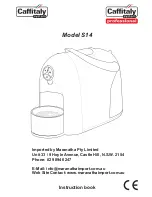
To keep your coffee maker operating efficiently, periodi-
cally you should clean away the mineral deposits left by
the water according to the water quality in your area and
the use frequency, we recommend removing mineral
deposits as follows:
1. Fill the tank with water and descaler to the max level
as indicated on water gauge (the scale of water and
descaler is 4:1, the detail refers to the instruction of
descaler. Please use “household descaler”, you may also
use the citric acid instead of the descaler (one hundred
parts of water and three parts of citric acid).
2. Insert the glass carafe onto the warming plate horizon-
tally.
3. Make ensure funnel is assembled in place.
4. Switch on the appliance and allow it to “brew” de-scal-
ing solution.
5. After “brew” one-cup solution, switch off the appliance.
6. Leave the solution stay for 15 minutes and repeat step
4-6.
7. Switch on the appliance and run off the solution until
the water tank is completely empty.
8. Rinse by operating the appliance with water at least 3
times.
1. A clean coffee maker is essential for making
great-tasting coffee. Regularly clean the coffee maker as
specified in the “CLEANING AND MAINTENANCE”
section. Always use fresh, cold water in the coffee
maker.
2. Store unused coffee powder in a cool, dry place. After
opening a package of coffee powder, reseal it tightly and
store it in a refrigerator to maintain its freshness.
3. For an optimum coffee taste, buy whole coffee beans
and finely grind them just before brewing.
4. Do not reuse coffee powder since this will greatly
reduce the coffee’ flavor. Reheating coffee is not recom-
mended as coffee is at its peak flavor immediately after
brewing.
5. Clean the coffee maker when over-extraction causes
oiliness. Small oil droplets on the surface of brewed,
black coffee are due to the extraction of oil from the
coffee powder.
6. Oiliness may occur more frequently if heavily roasted
coffees are used.
REMOVING MINERAL DEPOSITS
HINTS FOR GREAT-TASTING COFFEE
























